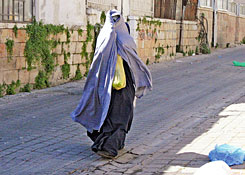I had an interesting conversation yesterday with my roommate Ariel, who is not only a calendar pinup girl but also a Young Jewish Leader of America.TM I mention this because she pointed me to Jameel’s translation at the Muqata, of an article from the Israeli newspaper Haaretz. It’s about a small group of haredi (aka “ultra-Orthodox Jewish”) women who have adopted the traditionally Muslim burqa.

This puts an interesting spin on the trend in recent years where Muslim women have claimed hijab as a personal, religious choice, (more links welcome for that if anyone has suggestions) — sometimes in opposition to the rest of the world becoming increasingly secularized and Westernized. When you look at it that way, and add in the centuries of how the interpretation of Jewish law has constantly evolved, it kind of makes sense that very conservative, orthodox Jewish women would adopt an invention designed for ultra-modesty.
The applicable law here is tznius (“modesty”), pretty much only observed in Orthodox Judaism these days. For the less halachically clued-in amongst us, tznius explains things in Orthodox communities like long-skirted fashions, women who shave their heads and wear wigs, and why if I want a really good deal on a nice camera around here my salesman is always very careful to set the camera down before I pick it up. What’s fascinating to me as an outsider is the amount of leeway and variety Jewish law allows different Orthodox communities, and even individuals. Ariel explained it to me as a principle of local determination, but alongside an exhortation to push yourself to reduce any chance of a modesty violation.
So… tznius applies to both men and women. But Jewish feminists (and heck, feminists in general) have been pointing out for years that women fall under more scrutiny than men do for this kind of thing. That’s clear when you look at some more translated quotes from Haaretz, provided by another post by Tali on BlogHer.
The latest news, as I have read in Israel’s Ha’Aretz, tells of a strange, Jewish women’s cult that has popped up in rural Israel. This cult is led by a Rabanit (=A female Rabi. In Hebrew the term means a wife of a Rabi, and doesn’t indicate the woman is a Rabi or schooler, herself), Bruria Keren, and abides by an extremely strict dress code of chastity, reminiscent of Muslim women. A religious woman must dress chastely, with shirt sleeves covering her elbows and a skirt down to her ankles. An extremely religious woman may sport a wig over her real hair, as her hair is “an instrument of seduction”. Keren’s women must cover their faces completely, with a shawl. “The whole of a woman is genitalia. It is forbidden for a man, other than your husband to see you.” Says one of Keren’s earnest students and assistant.
(A comment on that post, it should be noted, says that the correct meaning in context is “nakedness” and not “genitalia,” but Hebrew is one language I can’t read at all, so I have no idea.)
I mean, the hair being seductive thing I’ve heard about before, in Islam as well as Judaism. (And modest Christian teens note, a girl playing with her hair may be a stumbling block!) But your whole body being genitalia, or even nakedness? Ewww! Is this the natural, organic trend of religiously-enforced modesty over time? Is this just where it tends to go? This story has so many interesting angles to it that I don’t know where to go next. This is a women’s group, led by a female religious leader, who’s either a rabbi or a rabbi’s wife, I’m not sure. Some of these women’s husbands are not pleased with the whole burqa thing, and one couple even got divorced after a court found the practice too bizarre to allow for a continued marriage. Of course, just because men are upset by it doesn’t make it feminist; there’s a larger context of religiously-regulated modesty to think about, and one Israeli academic worries that rabbis may end up supporting this trend, making it more socially obligatory for Orthodox women in general. “Raising the bar,” so to speak.
Finally, it’s impossible to ignore how this practice makes it much more difficult to visually distinguish between Muslim women practicing hijab and haredi women practicing this strict form of tznius. This presents a problem in Israel. One women quoted in Jameel’s translation talks about her neighbors yelling anti-Arab slurs at her, and says she uses her kids (who presumably look more identifiably Jewish) to prove she’s not an Arab during security checks. Shit, she wouldn’t want to have to deal with Traveling While Arab. I really wonder if any of this small group of women are thinking much about the ramifications and larger meaning of their acts in the ethnic context of Israel and Palestine? All I can say is “whoa… fascinating.” I’d be very interested in takes on this from people who feel more connected to Jewish tradition, haredi communities, the practice of tznius in various places, and equivalents in other cultures such as hijab.